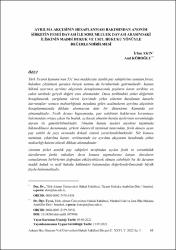Ayrılma akçesinin hesaplanması bakımından anonim şirketin feshi davası ile sorumluluk davası arasındaki ilişkinin maddi hukuk ve usul hukuku yönüyle değerlendirilmesi
Citation
Akın, İrfan ve Köroğlu, Anıl (2022). Ayrılma akçesinin hesaplanması bakımından anonim şirketin feshi davası ile sorumluluk davası arasındaki ilişkinin maddi hukuk ve usul hukuku yönüyle değerlendirilmesi, 26 (3) 61-76.Abstract
Türk Ticaret Kanunu’nun 531’inci maddesiyle azınlık pay sahiplerine sunulan fırsat, hukuken çözülmesi gereken birçok sorunu da beraberinde getirmektedir. Kanun hükmü uyarınca ayrılma akçesinin hesaplanmasında payların karar tarihine en yakın tarihteki gerçek değeri esas alınmalıdır. Dava tarihindeki şirket değerinin hesaplanarak, yargılama süresi içerisinde şirket yönetim kurulunun kusurlu
davranışları sonucu malvarlığında meydana gelen azalmaların ayrılma akçesinin hesaplanmasında dikkate alınmasına dair bir düzenleme Kanunda yer almamaktadır. Fesih davası kapsamında, pay sahibinin haklarının korunması bakımından ortaya çıkan bu boşluk, açılacak yönetim kurulu üyelerinin sorumluluğu davası ile giderilebilmektedir. Yönetim kurulu üyeleri aleyhine tazminata hükmedilmesi durumunda, şirkete ödenecek tazminat tutarından, fesih davası açan pay sahibi de payı oranında dolaylı olarak yararlanabilmektedir. Söz konusu tazminat, çıkarılma kararı verilmesinde ise ayrılma akçesinin hesabında şirket malvarlığı kalemi olarak dikkate alınmaktadır. Anonim şirket azınlık pay sahipleri tarafından açılan fesih ve sorumluluk davalarının farklı vakıaları dava konusu yapmalarına karşın, davaların sonuçlarının birbirlerini doğrudan etkileyebilecek olması sebebiyle bu iki davanın maddi hukuk ve usûl hukuku hükümleri bakımından değerlendirilmesinde büyük fayda bulunmaktadır. The opportunity offered to minority shareholders by TTK m.531 also brings with it many problems that need to be resolved legally. Pursuant to the provision of the law, the actual value of the shares closest to the date of decision should be taken as a basis in the calculation of the financial settlement. There is no regulation in the Law that calculates the value of the company on the date of the lawsuit and takes
into account the decrease in the assets of the company's board of directors as a result of the faulty behavior of the company's board of directors in the calculation of the financial settlement. Within the scope of the termination lawsuit, this gap in terms of protecting the rights of the shareholders can be filled with the liability lawsuit of the members of the board of directors to be opened. In the event that
compensation is awarded against the members of the board of directors, the shareholder who has filed a termination lawsuit can also indirectly benefit from the compensation amount to be paid to the company at the rate of his share. The compensation is taken into account as an item of company assets in the calculation of the financial settlement when the decision to withdraw is made. Although the termination and liability lawsuits filed by the minority shareholders of the joint stock company make different cases the subject of judgment, it is of great benefit to evaluate these two lawsuits in terms of substantive law and procedural law, since the results of the lawsuits directly affect each other.
Volume
26Issue
3URI
https://dergipark.org.tr/tr/download/article-file/2278571https://hdl.handle.net/20.500.12846/731

















